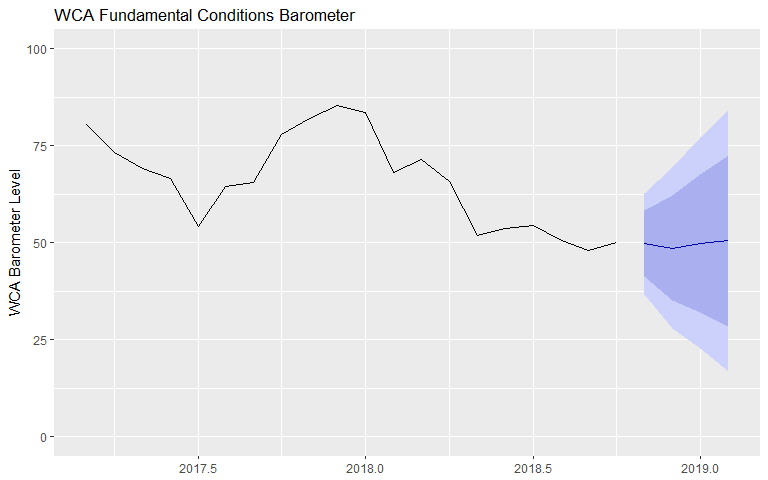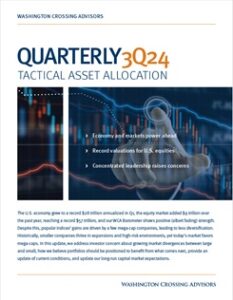Monday Morning Minute ~ December 3, 2018
An update on CONQUEST tactical portfolio strategy as we get set to close out the year.
How About the Economy?
Why should an investor care about keeping track of the economy? Isn’t it enough to just create a “set it and forget it” portfolio?
We think investors should care about the economy for two reasons. First, theups and downs of the economy creates risks to avoid and opportunities toexploit. Second, the size of the economy determines the value of the stockmarket and drives long-run return. This is why we, as active managers, devoteso much time evaluating economic data.
Near-Term Outlook
To help us make sense of what we see in the data, we turn to our WCA Fundamental Conditions Barometer (graph, below). The barometer summarizes an array of forward-looking indicators that see as important for investors to keep an eye on. Rather than present an analysis of dozens of charts, we distill all of the information into one easy-to-understand graph. The main purpose of the barometer is to give an unbiased answer to the question “Which way are fundamental trends headed?”

Source: Washington Crossing Advisors
This month’s update of the barometer has a forecast reading near 50 over the next few months. This is essentially a “neutral” reading and tells us a “neutral” allocation to stocks and bonds is an appropriate tactical posture. Negative trends in the foreign sector, and tightening financial conditions across global markets have weighed on the “barometer” since the spring. Accordingly, our tactical allocation to bonds has been raised, and stocks reduced.
Long-Run View
Beneath the month-to-month noise and crosscurrents, we continue to project lower long-run returns. The difference between our expected stock and bond return is the lowest since we began making such forecasts. This is important because it signals that we may be entering the later stages of this phase of the bull market. If so, defense becomes a more important aspect of the returns game.
Portfolio Strategy
Cash returns in the form of dividends and share repurchases are likely to account for a larger share of return going forward. Focus on consistent profitability, sustainable dividend growth, and conservatively financed businesses. We continue to favor U.S. over foreign; value over growth; high quality credit over low; and shorter over longer duration at this point in the cycle.
In a lower return / higher volatility environment we see active management as playing a more important role for many investors. As an ever-changing market environment creates opportunities to exploit. An unbiased, disciplined, tactical approach is one way of approaching the market environment we see ahead.
For more on our long-run outlook, please read our latest Quarterly Tactical Asset Allocation Report.
Kevin
Caron, CFA, Senior Portfolio Manager
Chad Morganlander, Senior Portfolio Manager
Matthew Battipaglia, Portfolio Manager
Suzanne Ashley, Analyst
(973)
549-4168
www.washingtoncrossingadvisors.com
www.stifel.com
Disclosures
WCA Fundamental Conditions Barometer Description: We regularly assess changes in fundamental conditions to help guide near-term asset allocation decisions. The analysis incorporates approximately 30 forward-looking indicators in categories ranging from Credit and Capital Markets to U.S. Economic Conditions and Foreign Conditions. From each category of data, we create three diffusion-style sub-indices that measure the trends in the underlying data. Sustained improvement that is spread across a wide variety of observations will produce index readings above 50 (potentially favoring stocks), while readings below 50 would indicate potential deterioration (potentially favoring bonds). The WCA Fundamental Conditions Index combines the three underlying categories into a single summary measure. This measure can be thought of as a “barometer” for changes in fundamental conditions.
The information contained herein has been prepared from sources believed to be reliable but is not guaranteed by us and is not a complete summary or statement of all available data, nor is it considered an offer to buy or sell any securities referred to herein. Opinions expressed are subject to change without notice and do not take into account the particular investment objectives, financial situation, or needs of individual investors. There is no guarantee that the figures or opinions forecasted in this report will be realized or achieved. Employees of Stifel, Nicolaus & Company, Incorporated or its affiliates may, at times, release written or oral commentary, technical analysis, or trading strategies that differ from the opinions expressed within. Past performance is no guarantee of future results. Indices are unmanaged, and you cannot invest directly in an index.
Asset allocation and diversification do not ensure a profit and may not protect against loss. There are special considerations associated with international investing, including the risk of currency fluctuations and political and economic events. Investing in emerging markets may involve greater risk and volatility than investing in more developed countries. Due to their narrow focus, sector-based investments typically exhibit greater volatility. Small company stocks are typically more volatile and carry additional risks, since smaller companies generally are not as well established as larger companies. Property values can fall due to environmental, economic, or other reasons, and changes in interest rates can negatively impact the performance of real estate companies. When investing in bonds, it is important to note that as interest rates rise, bond prices will fall. High-yield bonds have greater credit risk than higher-quality bonds. The risk of loss in trading commodities and futures can be substantial. You should therefore carefully consider whether such trading is suitable for you in light of your financial condition. The high degree of leverage that is often obtainable in commodity trading can work against you as well as for you. The use of leverage can lead to large losses as well as gains.
All investments involve risk, including loss of principal, and there is no guarantee that investment objectives will be met. It is important to review your investment objectives, risk tolerance and liquidity needs before choosing an investment style or manager. Equity investments are subject generally to market, market sector, market liquidity, issuer, and investment style risks, among other factors to varying degrees. Fixed Income investments are subject to market, market liquidity, issuer, investment style, interest rate, credit quality, and call risks, among other factors to varying degrees.
This commentary often expresses opinions about the direction of market, investment sector and other trends. The opinions should not be considered predictions of future results. The information contained in this report is based on sources believed to be reliable, but is not guaranteed and not necessarily complete.
Washington Crossing Advisors LLC is a wholly owned subsidiary and affiliated SEC Registered Investment Adviser of Stifel Financial Corp (NYSE: SF).



